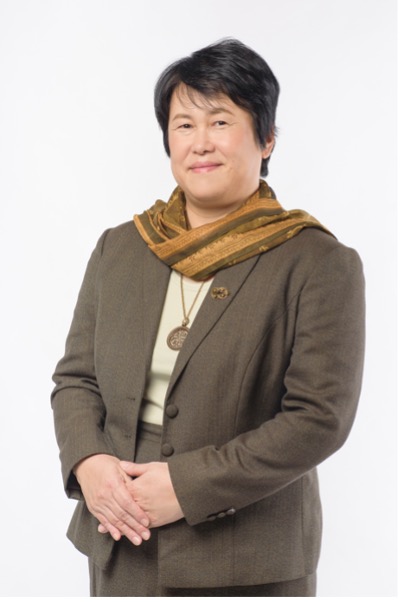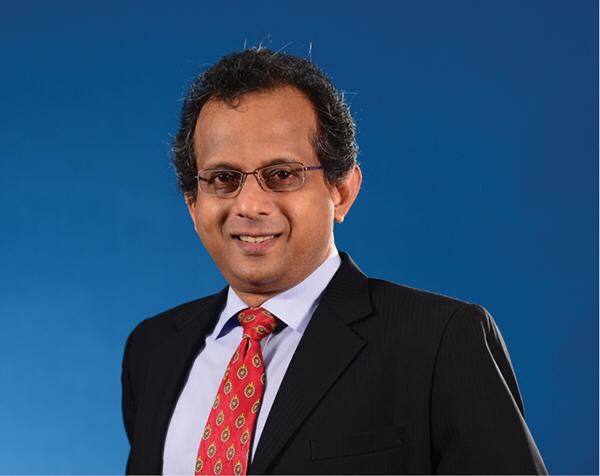
| Mr. Mark Williams is an economist with over 20 years of experience in the economics, regulation, and strategy of the digital sector, covering a range of specialist areas including strategy, policy, regulation, financial analysis corporate restructuring, and litigation. Mark has worked in some of the world’s leading economic consulting firms -NERA, Frontier Economics, Deloitte, and Berkeley Research Group (BRG). Previously in his career, he spent six years as an economist in the World Bank’s Global ICT team focusing on analytical work and operations in the Middle East and Africa.
|

| Ms. Atsuko Okuda was appointed as the Regional Director in April 2020. Prior to the new assignment, she was the Chief of the ICT and Development Section of the ICT and Disaster Risk Reduction Division of the United Nations Economic and Social Commission for Asia and the Pacific (ESCAP), in Bangkok, Thailand from 2015 to 2020. At ESCAP, she promoted the development of regional broadband connectivity and inclusive broadband through the implementation of the Asia-Pacific Information Superhighway (AP-IS) initiative. Before joining ESCAP, Ms. Okuda served the United Nations Economic and Social Commission for Western Asia (ESCWA) in Beirut as the Chief of the Governance and State building Section and as the Team Leader responsible for ESCWA Knowledge Management. Prior to it, she contributed to the Umoja project, the UN Secretariat ERP initiative, as Testing Manager at the Department of Management, UNHQ for 2 years. From 2002 to 2010, she was responsible for promoting a wide range of ICT for development initiatives at ESCAP and the United Nations Economic Commission for Africa (ECA) as Senior IT Officer. She started her UN career in the area of ICT for Development at the Regional Bureau for Asia and the Pacific, the Bureau for Development Policy and UNDP Country Office in Bhutan from 1997 to 2002. Ms. Okuda obtained BA from Kyoto University (Japan), MA from Helsinki University (Finland) and PhD from the United Nations University – Maastricht Economic and Social Research Institute on Innovation and Technology (Netherlands). Her doctoral thesis focuses on the topic of e-governance in the context of anti-corruption efforts. Her academic articles on broadband and AI were published by the Lee Kwan Yew School of Public Policy. Among other publications and research papers, she was the author of a chapter on e-resilience in the 2018 UNDESA E-government Survey and various blogs on digital transformation at ESCAP and ITU.
|

| Ms. Marjo Baayen is the Director of the Global Forum on Cyber Expertise (GFCE) – a multi-stakeholder platform for countries, international organizations and private companies to exchange best practices and expertise on cyber capacity building. The GFCE is the outcome of the Global Conference on Cyber Space 2015 and Marjo has had a key role as Project Leader in the organization of this Conference. With over 20 years of management experience in international cooperation programmes and project management in Asia, Africa, Europe and the USA, she currently leads the operational management of the GFCE Secretariat and is responsible for the overall coordination of GFCE Meetings and Working Groups. Marjo holds an MSc in Public Administration and Policy.
|

| Mr. Daesik Shin, Director is the director of Cyber Security Planning Division at the Ministry of Science and ICT. Prior to that he was working as a Team Director of Digital Inclusion Policy Team and Network Security Planning Team. He holds a master’s in public administration at Rockefeller college of State University of New York and a B.A. in Electrical Engineering from the Korea University, Korea.
|

|
Mr. Andrew Toimoana is the Director of the newly established Digital Transformation Department under the Prime Minister’s Office of Tonga since January 2022. He has been involved with all the Digital development and E-Government project for Tonga since he started his new career as a civil servant in 2015. In 2018, He successfully completed the first Tonga digital platform project known as the National Information Communication Technology (NICT) in which consisted of a Government Secured IP-Network, Government Cloud Datacentre and Government Unify Communication system. He also played a major role in establishing the Tonga National Computer Emergency Response Team (CERT) back in 2016 under his leadership. With his new role in the Digital Transformation Department, he is responsible for the completion of the Tonga National Cyber Security Framework and Tonga Government Enterprise Architecture Frameworks as well as other components of the Tonga Digital Government Support Project funded by World Bank.
|

| Ms. Bolor-Erdene Battsengel, State Secretary and Acting deputy minister of the newly established Ministry of Digital Development of Mongolia and former Chairwoman of the Government of Mongolia’s Communication and Information Technology Authority, the youngest and first female to hold this position. As the youngest leader in the current Cabinet, she crafted the four-year plan to transform Mongolia into a “Digital Nation”. In the first year, Ms.Battsengel launched the ‘E-Mongolia’ platform that transformed the country by introducing 610 government services available online. As result, the platform notably reduced red-tape bureaucracy and corruption while ensuring inclusiveness to serve those live as nomads in the countryside as well as vulnerable communities of the countries. Now she is sharing this platform and experience with many other developing countries and helping them to deliver government services during the pandemic. Raised in the countryside herself, Ms.Battsengel started the “Girls for Coding” program which trains girls from vulnerable families in remote areas who do not have computer or internet access. So far, the program trained 50 girls who already offered jobs at varies companies. She studied public policy at Oxford and previously worked at the World Bank, United Nations, Asian Development Bank, and Cabinet Office of the United Kingdom. She was currently selected as Forbes Asia 30 Under 30 and Young Global Leader of the World Economic Forum.
|

| Mr. Rohan Muttiah is an experienced professional having worked for over 42 years in 5 countries, including 19 years in Australia. His experience covers multiple industries including Banking, Technology, Airlines, BPO, Hospitality, and Tourism. His senior most roles include CEO, COO, and CIO, as well as Chairmanships of bodies and committees at SWIFT, the Central Bank of Sri Lanka, the Banks’ CIO Forum, and SLCERT. As CIO of JKH, Rohan led the implementation of SAP across 10 sectors and 66 companies in 9 months, as well as the subsequent setting up of Shared Services for the group. Rohan was instrumental in drafting the Baseline Security Standard for the Banking Industry in Sri Lanka, ISO27001 certification in 2 banks, and PCI-DSS certification in a bank. Rohan is a graduate of Monash University, Melbourne, Australia.
|

| Mr. Richard Elwin is a Principal Policy Advisor in New Zealand’s National Cyber Policy Office (NCPO) within the Department of the Prime Minister and Cabinet. The NCPO leads the development of cyber security policy advice, provides advice to the Government on investing in cyber security activities and leads New Zealand's international engagement on cyber security policy with Ministry of Foreign Affairs and Trade.
Most recently Richard has been the cyber security policy lead for the Digital Strategy for Aotearoa New Zealand, which seeks to shape New Zealand’s digital transformation, and a wide range of areas at the convergence of technology and national security issues. Richard took a lead role in drafting New Zealand’s Cyber Security Strategy 2019, and has worked on strategy and prioritisation projects including Defence White Papers, Defence Assessments and projects in the economic development and science sectors.
|

| Mr. Hagai Mei-Zahav is a Cybersecurity Specialist with the World Bank’s Digital Development global practice. His focus is on promoting cybersecurity global initiative, working collaboratively across sectors and regions, addressing World Bank’s client growing demand. He is also supporting the bank’s operational teams advising governments on advancing their cyber resilience, designing and implementing strategies and deploying cyber solutions. Hagai is Co-Leading the World Bank’s Cybersecurity Community of Practice. Prior to the World bank, Hagai worked as a Director for International Cooperation at Israel’s National Cyber Directorate, leading Israel’s business development on cybersecurity with Europe and Asia-Pacific regions. Hagai is a professional diplomat. He served as Israel’s Deputy Ambassador to Hungary and Israel’s Deputy Consul-General to Sao-Paulo, Brazil. He holds a Bachelor of Science in Information Management, and master’s in business administration.
|

| Mr. Giacomo Assenza is a Cybersecurity Research Officer at the International Telecommunication Union and PhD candidate in Engineering for Humans and Environment at the University Campus Biomedico, where he is also tutor for the Cybersecurity module. His research interests cover the development of cybersecurity strategies for the protection of critical sectors. Giacomo has a background in consulting and academia and has achieved several publications in academic, technical and educational journals.
|